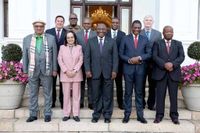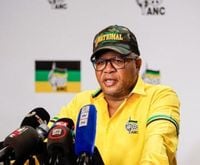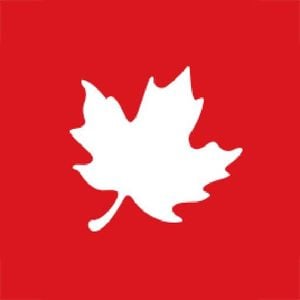The political landscape in South Africa is undergoing significant shifts as tensions ease between the African National Congress (ANC) and the Democratic Alliance (DA), the two largest parties in the Government of National Unity (GNU). This change comes in the wake of public pressure and market reactions following the DA's recent vote against the GNU's 2025 Budget. The situation escalated after the DA's dissent, but a meeting held on April 12, 2025, resulted in both parties issuing conciliatory statements, indicating a willingness to move forward together.
The meeting was described as "constructive" by both parties, with cautious optimism emerging about their commitment to prioritize national interests over political gamesmanship. From the beginning, it was evident that the GNU risked becoming a platform for political point-scoring, particularly as the delay in announcing the Cabinet in June highlighted personal and party ambitions taking precedence over governance.
Fikile Mbalula, the ANC secretary-general, emphasized the need for cooperation, stating, "If the DA wants South Africa to function, it must cooperate in the Government of National Unity." He expressed the ANC's responsibility to lead the country and warned against allowing political games to derail governance. Mbalula's remarks reflect a growing frustration within the ANC regarding the DA's conduct, particularly in light of the recent budget vote, which the ANC passed without DA support.
In a recent interview, Mbalula stated, "We’ve got the bigger responsibility than the DA and everyone else to run this country, to lead as the leading party. Answers are expected from us, not from the DA." He further cautioned against reckless decisions that could jeopardize the country's stability, asserting that the ANC would not behave like a "small puppy" within the GNU.
Despite the tensions, the DA's federal council chair, Helen Zille, reaffirmed the party's commitment to finding solutions that serve South Africa's best interests. Zille characterized the weekend talks with the ANC as respectful and frank, emphasizing the need to resolve the budget impasse and enhance cooperation within the GNU.
Political analysts have noted that the ongoing public disputes between the ANC and the DA are not unexpected. Professor Sethulego Matebesi from the University of the Free State remarked that the DA is unlikely to abandon the GNU, despite its ongoing court case challenging aspects of the budget. He stated, "There is no way that the DA will leave the GNU." He acknowledged that ideological differences between the parties, particularly regarding policies like the Land Expropriation Act and affirmative action, will continue to lead to disagreements.
As the ANC and DA navigate their partnership, the political dynamics within the GNU are further complicated by the looming ANC national conference in 2027. Professor Andre Duvenhage pointed out that differing opinions between President Cyril Ramaphosa and Deputy President Paul Mashatile regarding the DA's role in the GNU reflect deeper divides within the ANC. Mashatile has adopted a hardline stance, suggesting that the GNU will be reconfigured to ensure that other parties are included, while Ramaphosa has called for calm and cooperation among GNU partners.
During a recent working dinner with political party leaders, President Ramaphosa reiterated the importance of unity and collaboration, stating, "We are going to be making decisions based on our considerations and evaluation of everything that has happened." His approach contrasts with Mashatile’s more aggressive tactics, which have included likening the DA to dealing with a crocodile, emphasizing the need for vigilance in their dealings.
Amid these tensions, the ANC has expressed its commitment to engaging with all political parties within the GNU. Mbalula indicated that the ANC has reached out to various parties, seeking dialogue to conclude negotiations by May 6, 2025. This outreach underscores the ANC's desire to stabilize the political environment and ensure effective governance.
Furthermore, the ANC's recent meetings with organizations like Rise Mzansi have highlighted a shared resolve to stabilize public finances and promote national development. ANC spokesperson Hlengiwe Bhengu-Motsiri noted the importance of the adopted fiscal framework to protect frontline services and unlock growth, emphasizing that the GNU partners must operate on mutual respect and clarity of purpose.
As the ANC and DA continue their discussions, both parties face the challenge of addressing their ideological differences while striving for national unity. The fiscal framework approved in Parliament on April 2, 2025, with 194 votes in support and 182 against, serves as a critical point of contention, with the DA challenging aspects of it in the Western Cape High Court.
Political analysts like Nkosikhulule Nyembezi have urged parties to prioritize national interests over narrow political ideologies. Nyembezi criticized the budget vote, stating, "A national budget is supposed to reflect a collegial relationship and consensus among lawmakers." He called for greater collaboration to avoid the petty disagreements that have characterized recent interactions between the ANC and DA.
As the political landscape evolves, it remains to be seen whether the ANC and DA can effectively navigate their differences and work together for the benefit of South Africa. The pressure from both the public and the business community may serve as a catalyst for cooperation, but the underlying ideological divides will likely continue to pose challenges.
In conclusion, the ongoing negotiations between the ANC and DA illustrate the complexities of coalition governance in South Africa. As both parties strive to balance their ambitions with the needs of the nation, their ability to find common ground will be crucial in shaping the future of the GNU and, ultimately, the country itself.





